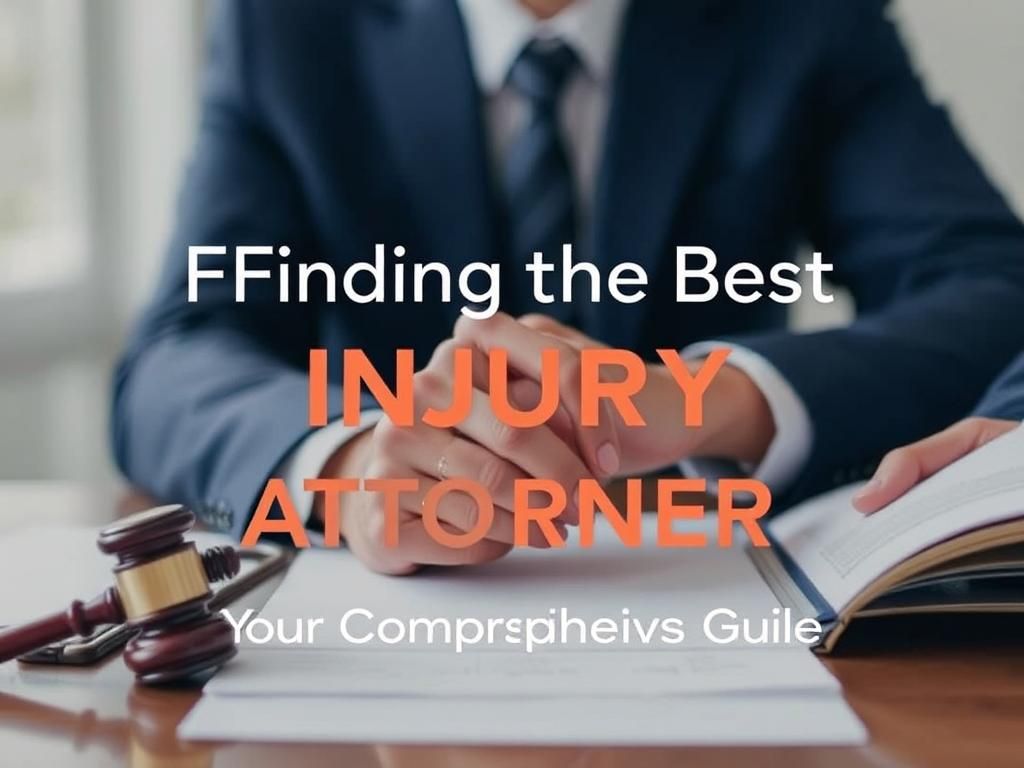When faced with the aftermath of an accident or injury, the road to recovery can be daunting. An injury attorney plays a crucial role in navigating the complex legal landscape, ensuring victims receive the compensation they deserve. Choosing the best injury attorney can significantly impact the outcome of your case, making it imperative to understand what factors contribute to an attorney’s success in personal injury law. This article will delve into what defines a great injury attorney and how you can find one to support you during this challenging time.
Understanding Personal Injury Law
Types of Personal Injury Cases
Personal injury law encompasses various incidents where an individual sustains harm due to another’s negligence or reckless behavior. Common types of personal injury cases include:
- Car accidents: These cases often result from distracted driving, speeding, or driving under the influence.
- Slip and fall accidents: Property owners have a duty to maintain safe conditions, and failure to do so can lead to serious injuries.
- Medical malpractice: This involves negligence by healthcare professionals that leads to patient harm.
- Workers’ compensation: Employees injured on the job can file claims for medical expenses and lost wages.
- Defective products: Manufacturers can be held liable for injuries caused by unsafe products.
Legal Rights of Injury Victims
Injured individuals have specific legal rights, which include:
- Right to compensation: Victims may claim damages for medical expenses, lost wages, and pain and suffering.
- Importance of timely legal action: Prompt action is critical, as statutes of limitations restrict the timeframe for filing claims.
- Understanding negligence and liability: Proving that another party is at fault is essential in personal injury cases.
Qualities of the Best Injury Attorney
Experience and Specialization
When searching for the best injury attorney, one of the primary characteristics to consider is their experience. Look for attorneys with:
- Years of practice: A seasoned attorney who has handled numerous personal injury cases will have the skills to effectively manage your claim.
- Track record of successful cases: Successful past cases often indicate the attorney’s ability to navigate challenging legal issues.
Reputation and Reviews
A lawyer’s reputation can speak volumes about their capabilities. Consider the following:
- Importance of client testimonials: Positive testimonials can give insight into how an attorney treats their clients and the outcomes they achieve.
- Researching online reviews and ratings: Websites like Avvo or Martindale-Hubbell provide attorney ratings based on peer reviews and client feedback.
Communication Skills
An effective attorney should possess strong communication skills, which include:
- Clear and transparent communication: The best injury attorney should be able to explain complex legal concepts in simple terms.
- Accessibility and responsiveness: A timely response to your inquiries can greatly reduce stress during the legal process.
Negotiation Skills
The ability to negotiate settlements can make or break your case. Look for attorneys with:
- Experience in negotiating settlements: Skilled negotiators can secure better compensation for victims.
- Ability to handle insurance companies: Insurers often aim to settle for the lowest amount; a strong attorney can ensure that victims get a fair offer.
Finding the Best Injury Attorney
Research Strategies
Finding the best injury attorney can seem overwhelming, but several strategies can simplify this task:
- Online directories and attorney review sites: Websites such as FindLaw or LegalMatch can connect you with qualified lawyers in your area.
- Local bar associations and legal aid organizations: They often provide referrals and resources for finding qualified attorneys.
Initial Consultations
Many attorneys offer free initial consultations. This meeting is an opportunity to gauge their suitability for your case. Key questions to ask include:
- Experience with similar cases: Ensure they have handled cases comparable to yours in terms of complexity and field.
- Fee structure and payment arrangements: Understanding how they charge for services upfront can prevent unexpected surprises later.

Evaluating Fees and Costs
Financial considerations are critical when hiring an attorney. Familiarize yourself with:
- Understanding contingency fees: Most personal injury attorneys work on a contingency fee basis, meaning they only get paid if you win your case.
- Upfront costs versus when fees are due: Discussing when fees apply can help manage expectations during your case.
Questions to Ask Potential Injury Attorneys
Relevant Experience and Track Record
Before making your choice, inquire about:
- Specific case handling experience: It’s important to know how many similar cases they have won and the legal challenges they faced.
- Success rates in trials and settlements: Understanding their performance in court can indicate how effectively they may handle your case.
Strategy and Approach to Cases
Ask about their strategy for handling your case:
- How they plan to handle your case: Their proposed approach should instill confidence in their abilities.
- Resources available for investigation and support: Inquire about the team they have supporting them, such as paralegals or expert witnesses.
Support Staff and Team
Understanding who is involved in your case is critical. Ask about:
- Who will handle case aspects: Knowing whether paralegals or assistants will be involved can give insights into how your case is managed.
- Access to experts and consultants: Your attorney may need to consult with medical professionals or accident reconstructionists to fortify your case.
The Role of the Injury Attorney During Case Proceedings
Investigation and Evidence Gathering
The actions taken at the outset of your case are often crucial. An experienced attorney will focus on:
- Importance of collecting evidence early: Early collection of evidence can strengthen your case significantly.
- Types of evidence needed: This may include medical records, police reports, and witness statements.
Filing Claims and Legal Procedures
The process of filing claims can be intricate. Key aspects include:
- Steps involved in filing a personal injury claim: Your attorney will guide you through submitting necessary documentation.
- Timelines and deadlines to be aware of: Understanding important dates for filing can prevent missed opportunities for compensation.
Representation in Negotiations and Court
A skilled attorney is vital for:
- Negotiating settlements with insurers: Having an attorney can significantly alter the negotiations process, increasing compensation chances.
- Preparing for trial if necessary: If a settlement cannot be reached, having a capable attorney to represent you in court is essential.
Conclusion
Taking the time to select the best injury attorney can be pivotal to achieving a favorable outcome in your case. Invest in research, ask the right questions, and don’t rush the decision-making process. By ensuring you choose wisely, you set the foundation for a strong legal representation that can make a difference in your recovery journey.

Additional Resources
For further information on personal injury law and finding legal help, consider exploring the following resources:
| Key Factors | Importance | How to Evaluate |
|---|---|---|
| Experience | A seasoned attorney is more likely to have successful outcomes. | Ask about past case experiences and success rates. |
| Reputation | Positive reviews enhance credibility and trust. | Check online reviews and testimonials. |
| Communication Skills | Effective communication fosters trust and clarity. | Assess their responsiveness during initial meetings. |
| Negotiation Skills | Strong negotiators can secure better settlements. | Discuss their experience with insurance companies. |
| Fees | Understanding the fee structure is crucial for financial planning. | Inquire about contingency fees and other costs early on. |
FAQs
1. What is the average cost of hiring an injury attorney?
Many work on a contingency fee basis, typically taking 33% to 40% of the settlement obtained.
2. How long will my personal injury case take?
Each case varies based on complexity, but most settle within a few months to a couple of years.
3. Can I handle my own injury case without a lawyer?
While it’s possible, having a qualified attorney can significantly enhance your chances of receiving fair compensation.
4. What should I bring to my initial consultation?
Bring any documentation related to your case, including medical records, bills, and photographs of the accident scene.
5. Do all personal injury cases go to trial?
No, many cases settle before trial, often during negotiations with the insurance company.
6. What is negligence in a personal injury case?
Negligence occurs when a party fails to act with reasonable care, resulting in injury to another party.
7. How much compensation can I expect from my case?
The amount varies widely based on factors like the severity of injuries, medical expenses, and lost wages.
8. What happens if I miss the statute of limitations?
Missing the deadline typically results in forfeiting your right to file a lawsuit for compensation.
9. Can I still pursue a claim if I contributed to the accident?
Yes, in many jurisdictions, you may still be eligible for damages, though your compensation may be reduced.
10. Is it worth hiring a personal injury attorney?
For most, the expertise and resources an attorney provides significantly outweigh the costs associated with hiring legal representation.

